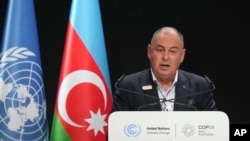China and the Cook Islands on Friday signed a comprehensive strategic partnership agreement, but the lack of transparency around the details has alarmed New Zealand, the South Pacific state’s closest democratic ally.
While details of the agreement remain unclear, public statements from Cook Islands Prime Minister Mark Brown and the islands’ Seabed Minerals Authority signaled that the Cook Islands and China would look to deepen cooperation in areas such as deep-sea mining, infrastructure enhancement, climate resilience, and economic cooperation.
The signing of the agreement is part of Brown’s seven-day diplomatic tour to China, during which he visited several Chinese research institutions and met with Chinese Premier Li Qiang in the northern city of Harbin.
Li said Beijing is willing to "deepen political mutual trust and expand practical cooperation with the Cook Islands," while Brown said his country will "strengthen multilateral coordination on climate change and in other areas, and push for the sustained, in-depth development of the bilateral comprehensive strategic partnership."
Analysts say the agreement is Beijing’s latest effort to increase its influence in the Pacific region amid growing tension between some Pacific countries, including the Cook Islands and Kiribati, and such democratic allies as New Zealand and Australia.
"China benefits from friction between longstanding partnerships in the Pacific as it seeks to position itself as an alternative partner," said Anna Powles, an associate professor in security studies at Massey University in New Zealand.
New Zealand has expressed serious concerns about the deal between the Cook Islands and China, criticizing the South Pacific country for lack of transparency and consultation with Wellington over the details.
The Cook Islands has a free association agreement with New Zealand, which allows it to manage its foreign affairs while requiring it to consult Wellington on issues related to foreign policy.
"Under our constitutional arrangements, we expect, you know, matters of defense and security to be transparently discussed between partners. That’s all we’re asking for here," New Zealand’s Prime Minister Christopher Luxon told a news conference Monday.
Despite New Zealand’s concerns, Brown has characterized conversations around the deal as "guided by what is best for the Cook Islands" and said "there is no need" for Wellington to get involved in the negotiation of the agreement with China.
Meanwhile, China said its relationship with the Cook Islands "does not target any third party, and should not be disrupted or restrained by any third party."
In addition to the lack of transparency and consultation, some experts say the China-Cook Islands agreement could also contain "dual civil-military use technology and infrastructure."
"This directly affects New Zealand and Cook Islands’ security and defense," Anne-Marie Brady, an expert on Chinese foreign policy at the University of Canterbury in New Zealand, told VOA in by email.
Tensions between Kiribati and democratic allies
Tension is also rising between New Zealand and Kiribati, another South Pacific state. After failing to secure a meeting with Kiribati President Taneti Maamau in January, New Zealand Foreign Minister Winston Peters said Wellington would review development funding to Kiribati following the diplomatic snub.
"The lack of political-level contact makes it very difficult for us to agree on joint priorities for our development program and to ensure that it is well targeted and delivers good value for money," Peters’ office said in a statement issued late last month.
In addition to Peters, Australian Deputy Prime Minister Richard Marles did not secure a meeting with Maamau during a trip to Kiribati last month, but he stuck with the original plan by delivering a patrol boat to the Pacific Island country.
Powles in New Zealand said Maamau’s decision not to meet with Peters and Marles may reflect a shift in Kiribati’s diplomatic focus.
"Kiribati’s primary bilateral relationships appear to be Fiji, Nauru, and China, and the lack of engagement with partners such as New Zealand reflects this," she told VOA by email.
Other experts say that while Kiribati and the Cook Islands are not necessarily looking to abandon their partnership with New Zealand, China will be looking to "capitalize" on recent events.
"China would seek to undermine those relationships and say ‘the West is paternalistic and colonialist and doesn’t genuinely have your interests at heart as China does,’" Blake Johnson, a senior analyst at the Australian Strategic Policy Institute, told VOA by phone.
Beijing’s attempts to increase diplomatic efforts in the Pacific also come as the United States freezes funding for foreign aid and New Zealand threatens to review development funding for Kiribati.
Since most Pacific Island countries rely heavily on foreign aid, Johnson said a potential lack of funding from democratic allies could force countries in the Pacific region to seek support from China. "China can be responsive when it wants to fill those [funding] gaps," he said.
To counter China’s attempt to increase diplomatic presence in the Pacific region, Parker Novak, a nonresident fellow at the Indo-Pacific Security Initiative at the Atlantic Council, said democratic countries, including Australia and the United States, should continue to provide support to Pacific Island countries.
Australia, the U.S., and other like-minded countries should continue "to foster positive, consultative relationships that help Pacific Island countries meet their development needs and provide a credible alternative to PRC inducements," he told VOA by email.




